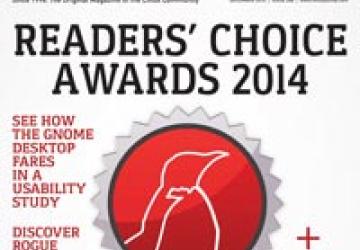December 2014 Issue of Linux Journal: Readers' Choice

The Best of the Best
I love the Readers' Choice issue. I jokingly say it's because all the work is done by the community, but honestly, it's because I love hearing the feedback from everyone. Year after year, I inevitably learn about a new technology or application, and I'm usually surprised by at least one of the voting results. It's also an "unthemed" issue, which means our articles can be from any discipline in the Linux world. Welcome to the Readers' Choice issue of Linux Journal.
Reuven M. Lerner starts us out this month with the modern-day equivalent of virtual name-based Web hosting. Multitenant programming allows a single server and/or application to serve multiple clients while keeping the cross-pollination of data from taking place. SaaS isn't a new concept, but Reuven shows how to peel back the cloud layer and see what goes on behind the scenes. If you're a Web developer, you won't want to miss it.
I've written several articles through the years on SSH, which I like to think
of as the Swiss Army Knife of command-line tools. Dave Taylor talks about
an equally powerful tool this month, namely the find command. It seems
like a simple concept, but with its various options,
find can be a
powerful addition to any Bash script.
Kyle Rankin talks about something I've never been able to get the hang of doing. He discusses the virtue of using the hjkl keys as opposed to arrow keys while editing text files. Every once in a while, you'll run across a computer that supports only the old-school method for moving the cursor around, but for Kyle, that old-school method is his preferred mode of operation. I have to admit, I'm a little jealous. I can play a first-person shooter with the "wasd" keys, but for some reason, my brain just can't get used to "hjkl". If you have no idea what I'm talking about, be sure to read Kyle's column.
I boldly go where no Shawn Powers has gone before and touch on development of all things. My entire IT career has been one where I've avoided programming. Recently, I had a need to create a Web-based interface for a user, and I learned PHP. Granted, PHP isn't the most modern or powerful programming language, but if you're like me, it might be the perfect intro to development. I urge anyone who hates programming to read my column. It might surprise you how much fun writing code can be.
Chris Jenks has a cool article in this issue where he teaches us to hunt rogue access points in a network. There obviously are apps for Android that will do basic scanning, but Chris goes a lot further and discusses passively gathering data, looking for even hidden SSID networks. If you have a need to track down rogue access points, but fear sneaky users are hiding their tracks, Chris' article is perfect.
Jim Hall goes searching this month as well, but in his case, he's searching for usability. Jim describes the process for formal usability testing and how it shapes changes in projects like GNOME, which he uses as an example. If you've ever been curious about how and why desktop programs function the way they do, Jim's article will be of incredible interest. In fact, usability is most likely one of the factors that influences the results of our Readers' Choice awards year after year. If proper testing has taken place, the chances for a particular technology to gain popularity are much higher. We stuck with a similar format as last year in this issue, and gave the entire range of votes as opposed to just the top few candidates. If people were told only about the most popular one or two desktop environments, no one would ever hear about Linux itself! There are a few upsets this year over last year, but every category is interesting with a few hidden gems that might not be as popular, but certainly are worth checking out.
This issue is truly an eclectic one, and although there's not a specific focus, that means we get to focus on "awesome stuff", which is always enjoyable. We have tech tips, product announcements, cool programs and enough information to keep an entire herd of nerds busy for weeks. We hope you enjoy the Readers' Choice issue of Linux Journal. I know we enjoyed putting it together.
Available to Subscribers: December 1










